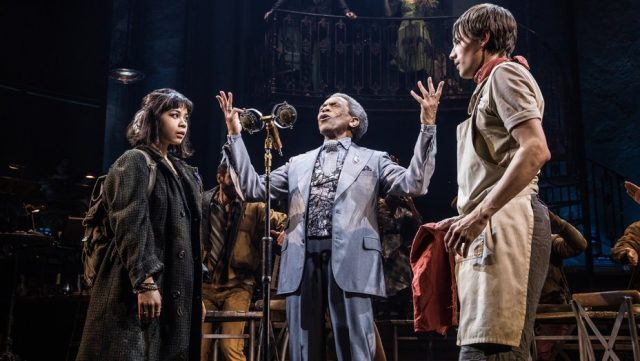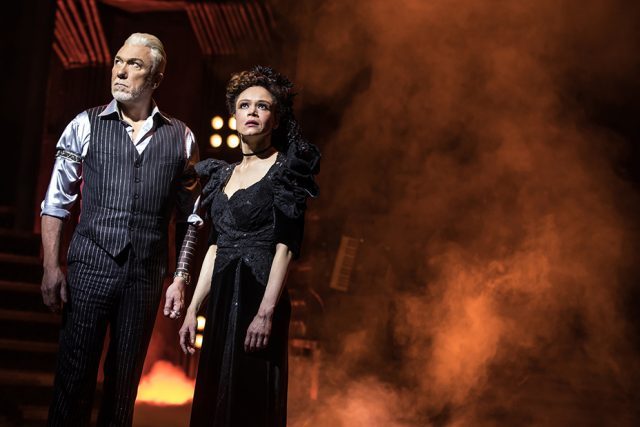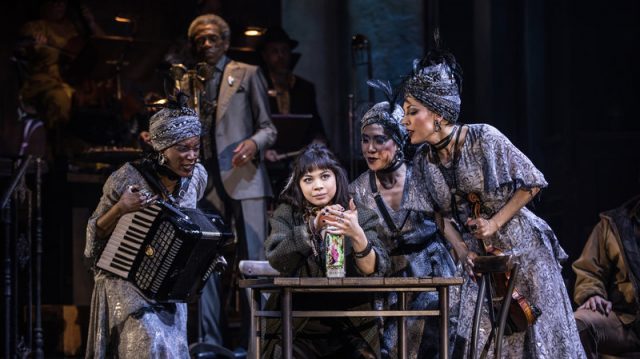
Hermes (André De Shields) narrates the love story between Eurydice (Eva Noblezada) and Orpheus (Reeve Carney) in Hadestown (photo by Matthew Murphy)
Walter Kerr Theatre
219 West 48th St. between Broadway & Eighth Ave.
Tuesday – Sunday through January 5, $109-$249
www.hadestown.com
After a thirteen-year gestation period, Anaïs Mitchell’s sizzling-hot Hadestown has descended on Broadway, burning it up to packed houses at the Walter Kerr Theatre. Mitchell wrote the book, music, and lyrics to the Tony-nominated show, which has transformed since 2006 from a small presentation in Vermont with friends and a 2010 concept album to evolving productions at New York Theatre Workshop, the Citadel in Canada, and London’s West End. The fiery musical is a potent combination of the Greek myths of Persephone and Hades, Orpheus and Eurydice, flavored with the American version of the proletarian struggle against capital. The narrative journeys from Persephone’s raucous jazz bar into the underworld, telling the tragic mythological fable of a doomed love affair between Orpheus (Reeve Carney), here written as a naïve, wide-eyed dreamer, and Eurydice (Eva Noblezada), who becomes a practical and realistic young traveler trying to survive in supremely hard times. They meet at a railway station on the road to hell, which is run by the devious King Hades (Patrick Page) and his far more sympathetic wife, Persephone (Amber Gray), from atop their not-quite-ivory tower. “Now some may say the weather ain’t the way it used to be / But let me tell you something that my mama said to me: / You take what you can get / And you make the most of it / So right now we’re living it,” Persephone sings.
Down below, in hell, a workers chorus of factory slaves (Afra Hines, Timothy Hughes, John Krause, Kimberly Marable, and Ahmad Simmons) toils away in horrific heat. The proceedings are narrated with devilish charm, Our Town-style, by Hermes (André De Shields), the messenger god. “It’s a sad song / It’s a sad tale, it’s a tragedy / It’s a sad song / But we sing it anyway,” he explains. When the desperate Eurydice is lured by Hades, Orpheus can save her only by writing the most beautiful song ever written as the Fates (Jewelle Blackman, Yvette Gonzalez-Nacer, and Kay Trinidad) keep a close watch on it all.

Hades (Patrick Page) and Persephone (Amber Gray) survey their domain in sizzling Broadway musical (photo by Matthew Murphy)
Director Rachel Chavkin (Natasha, Pierre & the Great Comet of 1812; Small Mouth Sounds) marvelously melds a steampunk aesthetic with New Orleans bravado and depression-era gloom, maintaining an energetic fast pace to what, at its heart, is a simple, poetic love story. Mitchell’s music, performed by onstage musicians (pianist Liam Robinson, violinist Dana Lyn, cellist Marika Hughes, guitarist Michael Chorney, trombonist Brian Drye, double bassist Robinson Morse, and percussionist Ben Perowsky) as if at a honky tonk, range from R&B, soul, and jazz to folk, blues, country, and pop with enthusiastic orchestrations by Todd Sickafoose and rousing choreography by David Neumann that avoid typical Broadway melodrama. Rachel Hauck’s set, anchored by Hades’s grim, looming tower, seems to breathe smoke and fire. Michael Krass’s costumes include some ravishing touches, from Persephone’s green velvet dress and Hades’s impeccable pinstripe suit to Hermes’s spectacular sharkskin ensemble.

Eurydice (Eva Noblezada) makes a decision she’ll regret as the Fates hover over in Hadestown (photo by Matthew Murphy)
Page (Spring Awakening, Coriolanus), whose booming baritone echoes throughout the theater, and Carney (Penny Dreadful; Hello, Stranger), who plays Orpheus with a sweet innocence, are worthy adversaries, having already battled it out in Spider-Man: Turn Off the Dark, in which Carney was the web-throwing superhero and Page the villainous Green Goblin. Noblezada (Les Misérables, Miss Saigon) does well as the underwritten, underdeveloped Eurydice, while Gray (Natasha, Pierre & the Great Comet of 1812; An Octoroon) has a stomping good time as Persephone. Mitchell and Chavkin make a strong connection between the burgeoning love between the young Orpheus and Eurydice, who are fighting fate for a chance at a life together, and Hades and Persephone, who lost their spark long ago and might not be able to get it back. There are also references to modern-day climate change, capitalism, and politics without getting heavy-handed, offering the hope of spring. “Wipe away your tears, brother / Brother, I know how you feel / I can see you’re blinded / By the sadness of it all,” Persephone declares. “Look a little closer and / Everything will be revealed / Look a little closer and / There’s a crack in the wall!”